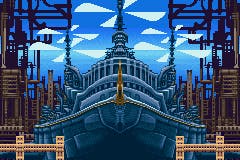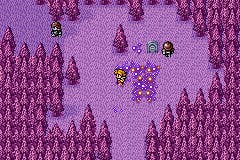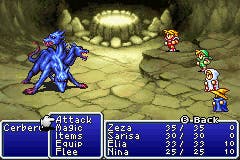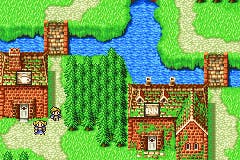Final Fantasy I & II: Dawn of Souls Review
Dawn of a dynasty, too.

There are a number of schools of thought on retro gaming. It's probably important, in the context of this review, that I pin my colours to the mast here - most old games are rubbish. Or to be precise, they've aged badly and become rubbish, just like your favourite shirt from five years ago, which now sees service washing the car on Sunday afternoon.
There, I've said it. You may feel free to call me a shallow, graphics-obsessed person of loose morals, but my personal viewpoint remains unchanged. While Kristan has been hacking a path through the retro trip that publishers appear to be subjecting us to of late, I've been standing on the sidelines wondering how he manages to play - let alone enjoy -such ancient piles of tat without having a nervous breakdown of some description.
I shouldn't have tempted fate, really. I should have kept thinking about the future. But no sooner was Final Fantasy I & II: Dawn of Souls dropped in the door than it was hurled in my direction as the resident Japanese RPG fanboy. Remember, kids; retro gaming can strike anywhere, at any time. Always carry protection.
First Fantasy, Actually

All that being said, I was more than happy to give Dawn of Souls a fair hearing. The GBA isn't lacking in terms of decent RPG titles, and the fact that they're 2D and in some cases remakes of older games (Breath of Fire springs to mind) does absolutely nothing to detract from them. For all that the Final Fantasy series has recently become a benchmark for gaming eye-candy, this is actually a genre that's very forgiving when it comes to graphics - a solid storyline and entertaining battle system, after all, are two elements which could be relayed on pieces of paper or in plain text if you wanted to be minimalist about it.
First thing's first, then. What this package contains isn't actually the original NES versions of Final Fantasy I and its brother II - each one has, in fact, been modified greatly since it first took a bow on the ancient system. The most obvious change is to the artwork, which has been updated to SNES-style sprites (copied, I believe, from the Wonderswan version which appeared in Japan a few years ago). We're not talking about a pinnacle of handheld graphics here by any means, but it's certainly easier on the eyes than the NES artwork was.
However, the most important changes aren't visual at all - they're the sweeping changes which have been made to the games in terms of battle systems, balance and even storyline. These are particularly obvious in Final Fantasy I, where the entire magic system has been radically overhauled and several new areas have been added to the game, but Final Fantasy II - arguably the most messy and directionless game in the series - has also gone under the knife, with the bandages coming off to reveal a rebalanced experience system and new storyline exposition scenes.
Something Old, Something New

For the most part, it seems that these changes have been made in order to bring the games in line with the expectations of players who started on later titles in the Final Fantasy series. Final Fantasy I, for example, loses its somewhat archaic magic system - which divided magic into "levels" and gave you a fixed number of casts at a certain level - in favour of the more common MP points system, as found in pretty much every Final Fantasy title since.
Final Fantasy II, meanwhile, retains its peculiar levelling up system, which is focused on giving your characters experience in specific areas (using magic a lot levels up your magic stat, taking a lot of damage levels up your hit points, and so on). The system is rebalanced to make it less painful - originally Final Fantasy II was an utterly unforgiving experience, where hours of levelling up could be required just to prevent your characters from falling off the game's power curve. However, it's still got its quirks, most notably the fact that there's no indication of how close you are to levelling specific statistics, which can make it pretty hard to see if you're actually achieving anything as you play.
Both games have been given some bonus content as well - new dungeons and areas in Final Fantasy I (which are nicely designed, although it's somewhat disappointing that they're populated with the same monsters found everywhere else in the world, albeit in different colours), and the aforementioned new story sequences in Final Fantasy II. There's also a "Bestiary" which allows you to view details of monsters you've fought in both games, which... Well, isn't very interesting actually, but it's worth mentioning its presence.
Out with the Old

The changes to the games outlined above, however, don't change the fact that what you're playing is a pair of the oldest RPGs on the block. These are games which really do hail from the dawn of a genre, and we all know that no matter how romantically it may be described in poetry and song, dawn is actually pretty cold, damp and unpleasant, and you'd really rather be in bed. While Square Enix has knocked some of the sharper corners off the games, what remains is still a weary slog along a levelling-up treadmill. You'll rarely spend more than ten seconds without being slapped with a random encounter, the level of character customisation available to you is absolutely minimal, and the strong storylines which have endeared Final Fantasy to the world in recent years simply aren't in evidence in these archaic predecessors.
In ways, then, we're puzzled about why Square Enix made the changes it did. Dawn of Souls absolutely fails to stand on its feet as a strong contender in the GBA RPG market - not when there are titles like Golden Sun, The Legend of Zelda: Minish Cap, Breath of Fire or even Final Fantasy Tactics Advance out there clamouring for attention. As a retro curiosity, allowing gamers to experience the genesis of one of their best-loved franchises, there's a certain degree of potential here, but what's the point of that if you're going to take out some of the really unusual systems - like FFI's magic system - and replace them with innovations from later in the series?
Final Fantasy I & II: Dawn of Souls is certainly one of the more passable products of the recent retro-gaming fad, but packaged up in the guise of a modern RPG - without the decency of the NES Classics range in terms of admitting to its own clapped-out state - it's going to be a major disappointment to most who pick it up. Tweaked battle systems and improved graphics can't hide the fact that time has not been kind to this style of gameplay - and Dawn of Souls ends up falling between two stools, with its value to interested fans reduced by the changes, and its value to everyone else minimal because the changes don't go far enough. Final Fantasy buffs will add this to their collections in a flash - unless you're very curious to see what an RPG looked like in the bad old good old days, everyone else should steer clear.

